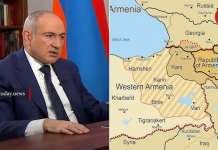By Suren Sargsyan published in The Armenian Mirror of Spectator
As a general rule, the elections held in one country can have a significant impact on bilateral relations, global politics, or geopolitical developments between the countries. Naturally, the case of the United States is particularly interesting in this context, as the events taking place there impact the entire world.
One of the best examples of the clearest state policy towards events in another country is Israel’s approach to the 2024 US elections. While Israel likely had a preferred candidate, it handled the situation with great care and diplomacy, avoiding any actions that could be seen as favoring one party over the other. Prime Minister Benjamin Netanyahu visited Washington, meeting with both Democratic Vice President Kamala Harris and Republican Donald Trump, carefully maintaining a political balance. Similarly, Israel’s ambassador to the US conducted his daily duties with the same level of tact, ensuring that Israel’s actions did not appear biased toward either side.
Certainly, many countries had a clear interest in the outcome of the US elections, including NATO and EU member states, Ukraine and Iran. However, none of these countries violated the established norms or openly displayed bias in the US domestic political process.
In addition to heads of states and political leaders, foreign ambassadors accredited to the United States also play a major role, representing the interests of the sending state.
From this perspective, it is interesting to study the messages that the Armenian government conveyed to the Armenian-American community during the election campaign through one of its information and propaganda tools, the Public TV Company of Armenia.
Also worthy of special attention is the daily activities of Ambassador Lilit Makunts throughout the entire US pre-election period, which contain relevant messages. Since Trump announced his nomination on November 16, 2022, Makunts has met with Democrats 20 times and with Republicans only 8 times in the Capitol.
It is interesting to note Ambassador Makunts’ participation in the Conventions of both the Republican and Democratic parties. Diplomatic representatives accredited in the US were invited to attend both events. However, apart from posting about her participation in the Republican convention, Lilit Makunts did not make any further comments on whether she had met with the representatives of the Republican Party.
Bottom of Form
Meanwhile, as for the Democratic National Convention, Makunts not only participated in the event, but also organized a working visit to Chicago (Illinois), a vibrant Democratic state where the convention was taking place, met with some representatives of the local Armenian community, and also ensured the participation of the Armenian National Assembly delegation, consisting exclusively of deputies from the Civil Contract party, in the event. Taking into account the specific nature of the US elections, it was either necessary to participate in the events of both US parties at the same level, or by participating only in the Democratic National Convention, it was necessary not to present it to the public in a way that would be perceived as biased.
This approach becomes even more crucial when considering the dynamics of the US electoral system. In the US elections, particularly in swing states, every citizen’s vote is crucial, as the votes in these states are often distributed almost equally between candidates. In swing states, the Armenian community is distributed as follows according to one estimate: Nevada – 35,000; Pennsylvania – 48,000; Michigan – 72,000; Georgia – 12,000; Arizona – 22,000; North Carolina – 12,000; and Wisconsin – 17,000.
Even if there were only 10,000 Armenian voters in each of these states, the outcome of their vote could have a serious impact on the election outcome. In light of this, it’s worth highlighting how each candidate was presented by the Public Television Channel. Let’s analyze a few interviews.
In particular, on November 5, the Public TV Company of Armenia hosted Arnold Bleyan, head of the Armenian Center for Democracy and Security Affairs who spoke about the US presidential election, its importance for our region, and the statements of the presidential candidates. The Public Television advertised the interview as “Open Platform: When making their choice, it would be wise for Armenian-Americans to consider the national interests of Armenia.”
The guest speaker specifically mentioned the following points: “We are at a decisive moment, and Armenian-Americans must understand this as well. I hope they will be wise and vote in favor of the Republic of Armenia [in favor of Kamala Harris]. From now on, they should not blame Armenia if any problems arise in the country, whether in the form of military aggression or economic collapse… Trump will end the war in Ukraine while respecting the principle of non-use of force. This will give everyone a free hand, including Azerbaijan… Today, Armenia’s statehood exists thanks to the United States—this is a fact, an undeniable fact.”
In turn, Californian-Armenian activist Viken Hovsepian, while being hosted by Petros Ghazaryan on Public TV, specifically noted: “Who can say that if I want the United States to have a policy in favor of Armenia, then I have to vote for Trump? That is absurd… At least there must be other considerations. First of all, Trump is much closer to Azerbaijan, even to some circles in Turkey, through his business, and moreover, he has carried out activities in Russia with Azerbaijani businessmen. There are no serious Armenian relations with Trump that would balance this out.”
And in an interview with Public Radio, Harut Sassounian, publisher of the California Courier newspaper, noted: “Trump is a very unpredictable candidate. No one knows what he will do; often, even he doesn’t know what he’s going to do. He decides based on whatever comes to his mind at the moment.”
It is clear that during the Biden administration, the US adopted a more active and proactive policy in the region and in relations with Armenia, and yes, Kamala Harris’ policy would most likely be a continuation of this policy. However, adopting a clearly selective approach — such as supporting a specific candidate and steering the Armenian community toward that candidate was not a very wise decision and most importantly not in the interests of Armenia.
Naturally, all the figures invited to these interviews were guided by their own perceptions of the results of the US presidential elections and their impact on Armenia, but it is not the experts’ opinions that pose a problem. The problem lies in the fact that the Public TV Company of Armenia did not even try to invite such figures who would express opposing opinions in order to maintain at least a seeming balance. Such an approach can be perceived as an attempt to interfere in the US elections and steer the Armenian community in the United States toward one candidate.












